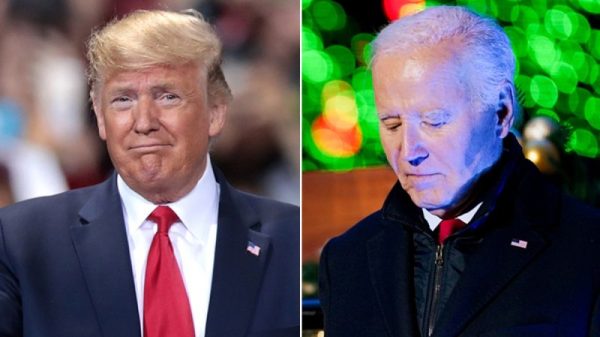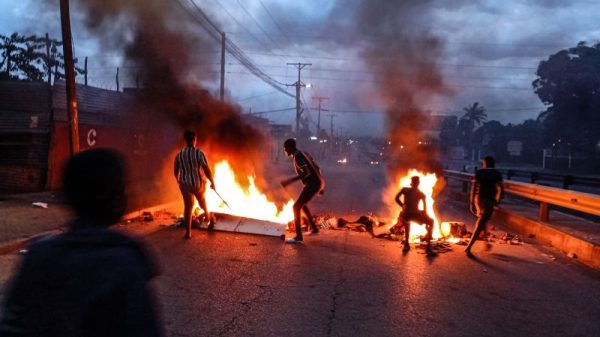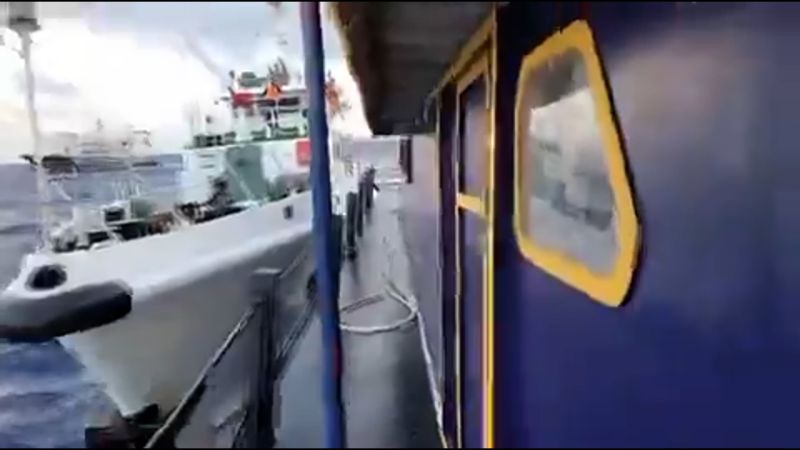Last weekend’s clashes between Chinese and Philippine vessels in the South China Sea send troubling signals that their standoff is worsening to a point where lives could be lost, potentially dragging the world’s two most-powerful militaries into open conflict, analysts warn.
“The escalatory cycle is worrying,” said Ray Powell, director of SeaLight, a project at the Gordian Knot Center for National Security Innovation at Stanford University that monitors maritime activities in the South China Sea.
Analysts described Sunday’s clash, in which Chinese Coast Guard water cannons disabled a Philippine boat, as the most serious of four publicized showdowns this year between the two countries in the waters near Second Thomas Shoal, a feature China claims as its territory but where Philippine marines man an outpost on a grounded ship.
The Philippine boats were attempting to bring supplies to the badly deteriorating ship, the Sierra Madre, when the Chinese Coast Guard tried to stop them, both countries acknowledge.
A Chinese Coast Guard ship “deployed a water cannon against the Philippine supply vessels causing severe damage to (one’s) engines, disabling the vessel and seriously endangering the lives of its crew,” the National Task Force for the West Philippine Sea said in a statement.
While no injuries were reported Sunday, the clash, which also included a collision between Chinese and Philippine vessels, shows that serious injuries or deaths are “certainly possible,” Powell said.
And because the Philippines, like nearby Japan and South Korea, has a mutual defense treaty with the United States, deaths of Filipinos could trigger US forces to respond.
US officials have repeatedly cited the treaty in public remarks on the South China Sea and the US State Department this week reiterated Washington’s stance following Sunday’s clash.
The United States “stands with our Philippine allies in the face of these dangerous and unlawful actions,” the statement said.
China’s Foreign Ministry, however, told Washington it has no standing in the dispute, saying “no third party has the right to intervene.”
Beijing claims “indisputable sovereignty” over almost all of the South China Sea, including many features hundreds of miles from mainland China. The Philippines, Malaysia, Vietnam, Brunei and Taiwan also hold competing claims.
In 2016, an international tribunal in The Hague ruled in favor of the Philippines and concluded that China has no legal basis to claim historic rights to the bulk of the South China Sea. But Beijing has ignored the ruling.
Flashpoint outpost
Second Thomas Shoal, known as Ayungin Shoal to the Philippines and Ren’ai Reef to China, sits in the Philippines’ exclusive economic zone.
Manila grounded the Sierra Madre, a World War II-era former US Navy transport ship, on Second Thomas Shoal in 1999 and has manned it with Filipino marines to enforce its claims to the area. But the rusting vessel is falling apart and is badly in need of regular repairs.
The situation on the shoal largely fell out of headlines while China set up military installations on other contested territories in the South China Sea over much of the past decade.
And the administration of former Philippine President Rodrigo Duterte tried to forge new economic ties with Beijing.
But President Ferdinand Marcos Jr., who took office in 2022, has taken a harder line on Chinese territorial claims and strengthened military cooperation with Washington.
But Beijing has been steadfast in its claim that Manila is illegally occupying the shoal.
On Monday, Chinese Foreign Ministry spokesperson Mao Ning accused the Philippines of seriously violating China’s sovereignty and endangering the safety of Chinese vessels and personnel.
But analysts counter that Beijing comes across as the aggressor.
“China acts, looks like and is being exposed as a bully,” said Carl Schuster, a former director of operations at the US Pacific Command’s Joint Intelligence Center.
And Beijing is looking to press its claim, the analysts say.
In a post on X, formerly Twitter, Koh said it may not even take explosive weapons to trigger the US-Philippine mutual defense treaty.
“When your water cannon attack actually caused physical damage, injury and potentially death, it begs the question about whether it matters whether you use firearms or just the kinetic force of water to qualify as an ‘armed attack’,” Koh wrote.
Any death might not have to be intentional, he said.
“Even if the Chinese try their best to avoid vertical escalation, what if there’s an inadvertent loss of lives, or severe injuries? Will that qualify as armed attack?” Koh asked.
US involvement
Koh, Schuster and others said Washington may have let the situation go too far already, emboldening Beijing to keep up the pressure on Manila to back off on its South China Sea claims.
Eric Sayers, a nonresident fellow at the American Enterprise Institute, wrote on X that Washington needs to “escalate” things with Beijing.
“They are estimating we won’t because we largely haven’t for the last 13 years since this type of behavior started,” he wrote.
Schuster said Washington needs more than State Department statements to dissuade China.
“Unless (the US) moves forces into position, Beijing will see no reason to avoid escalation,” he said.
Those forces could be direct US resupply of the grounded ship, the Sierra Madre, or at least joint escorts on the Philippine resupply missions, Koh said.
And the resupply missions are vital, said Sayers.
If Manila can’t get enough supplies to its ship on Second Thomas Shoal, Beijing could be even more assertive, he said.
And he warned that Washington can’t lose sight of the importance of support for Manila even while “the rest of the world is burning,” referring to ongoing wars in Ukraine and Gaza that appear to be dominating the foreign policy space in the US government.
The US needs to demonstrate that Asia is a priority along with Europe and the Middle East, Sayers said.
Can Washington “walk and chew gum like my Euro-centric American friends insist?” is a question that needs a strong answer, he wrote.







































